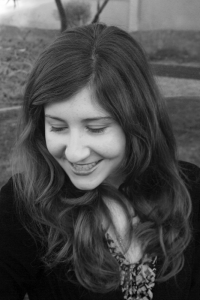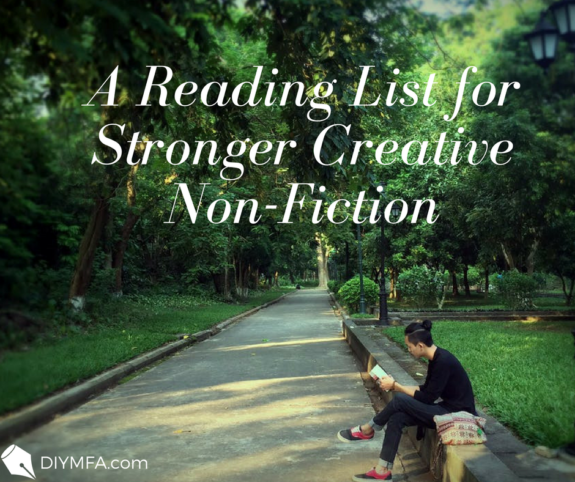Early this year, I read a book called The Kite and the String: How To Write With Spontaneity and Control –and Live to Tell the Tale. It’s a fiction craft book featuring some of the requisite advice you’d expect from a writer with several novels under her belt and loads of short stories in The Best American Short Stories. But her unique way of imbibing the advice with her life experience and reading makes her delivery unique. I’ll never forget the section that’s dedicated to coincidence—an aspect of craft that I’ve never heard anyone attempt. Basically, coincidence is great, but you shouldn’t let your plot hinge on it. Pretty great advice.
I’d say there are two things to take from this example: first, it’s quite possible for a fiction writer to have excellent aptitude for creative nonfiction. Also, it’s fine to encounter books by coincidence, but our reading lives shouldn’t hinge on discovering books that hang out on display shelves at the library.
One of the most important tenants of DIY MFA is reading with purpose. When you want to be a writer, you have to target your interests, and make sure that the books you pick up target them, too. I know—sometimes you want to read what you want to read. But your writing life needs some prioritizing. I’ve got some creative nonfiction recommendations for you, whether you’re a pro or just starting out.
The Craft Materials
Nothing is more important to your reading life than actually going to the narratives of great writers. But said great writers also have some great advice. For those starting out, I always recommend anything by Lee Gutkind. After all, he is the guy that coined the name for this genre. He’s the editor of Creative Nonfiction magazine and author of You Can’t Make This Stuff Up: The Complete Guide To Writing Creative Nonfiction. Although creative nonfiction certainly existed before Gutkind, he does have some helpful insight that may benefit you as you take up your journey in narrative nonfiction writing. Crafting the Personal Essay: A Guide For Writing and Publishing Creative Nonfiction by Dinty W. Moore is also a good place to go if you’re looking for specific advice on essays and not necessarily long form narratives.
Although this next one isn’t specifically about writing creative nonfiction, Steven Pinker’s The Sense of Style: The Thinking Person’s Guide to Writing in the 21st Century is a great update to everyone’s favorite Elements of Style.
The Websites + Magazines
So you want to be an essay writer? Reading the venues where they are frequently published can’t hurt. Hippocampus and the earlier mentioned Creative Nonfiction are all great locales for discovering that je ne sais quoi that only an essay can have. However, don’t limit yourself only to venues that specialize in creative nonfiction. If you’re also obsessed with literature, try Lit Hub or Electric Literature. The writers for these sites tackle everything from book news to pop culture without any reluctance to tackle a difficult subject. In general, it’s pretty helpful to look at online writing in venues like The Atlantic for conventional cues that you can emulate in your essays.
The Books
There are a few authors that I’m inevitably going to recommend because they are masters of the genre, but two of my favorites are Joan Didion and Virginia Woolf. Didion’s Blue Nights may be a short read, but her short chapters are masterful. Quite simply, she doesn’t mess around with extra words. Didion also places you right in the middle of her emotions and conflicts. Meanwhile, Woolf’s early essays that came before the novels resonate with wit, imagery, and an intangible quality that stamps her writing as entirely unique. Woolf’s propensity for expressing the present moment in spiraling prose is nothing short of genius. After all, A Room of One’s Own could well be considered a work of creative nonfiction.
If you’re curious about more works, this list is also a good reference to get started on what could be years of reading. Although it may seem a large task to read so much material, it’s one of the best things you can do for your writing. Besides actually writing, of course!
 Kayla Dean is an arts and entertainment writer in Las Vegas, where she has interviewed several celebrities for publications like Vegas Seven. She has several YA stories in the works and blogs about writing and creativity on her personal website, where she also hosts the Millennial Writer Series. She received her BA in English from the University of Nevada, Las Vegas and will pursue her Master’s in English Literature this fall. You can find her on Twitter@kayladeanwrites.
Kayla Dean is an arts and entertainment writer in Las Vegas, where she has interviewed several celebrities for publications like Vegas Seven. She has several YA stories in the works and blogs about writing and creativity on her personal website, where she also hosts the Millennial Writer Series. She received her BA in English from the University of Nevada, Las Vegas and will pursue her Master’s in English Literature this fall. You can find her on Twitter@kayladeanwrites.







